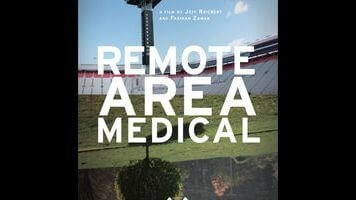A stirring, sermonizing-free micro portrait of the American healthcare system’s macro failings, Remote Area Medical charts four days in the operation of Remote Area Medical (RAM), a non-profit organization dedicated to bringing desperately needed health services to isolated areas—or, increasingly, to middle American regions where people can’t afford insurance. Over the course of a long weekend at the Bristol Motor Speedway in Tennessee, directors Farihah Zaman and Jeff Reichert detail the efforts of RAM to provide dental, ophthalmological, and other basic services to thousands of poor, rural citizens, who arrive in throngs, days in advance, to wait patiently in the stadium’s parking lot for a ticket to gain access to see volunteer doctors. It’s a mass gathering of staggering proportions, and one that the filmmakers detail with no narration but great attentiveness to their various subjects’ plights. The camera tracks every emotional up and down, through tests and surgery, with an unfussy precision that allows the themes to arise naturally.
Interspersing its action with various one-on-one interviews, Remote Area Medical makes plain that the enormous cost of insurance is the root cause of many health problems, which include teeth rotten beyond repair, eyes that have never been corrected by glasses, and 60-year-old bodies that haven’t been looked upon by professionals since their teens. Yet alongside those monetary concerns, the film also lays out—through more than one patient’s comments—the role upbringing plays in rural Americans not receiving proper care. A key impediment is a culture predicated on a go-it-alone, do-it-yourself attitude; problems, personal or otherwise, are to be fixed by oneself, not through the help of others (much less strangers). Furthermore, many people freely admit that destitution only further fosters a desire to retreat from the world, thus impeding any chance of getting care. It’s a vicious cycle that RMA’s free aid aims to fix, at least in some small way.
Compounding matters is the lengths to which people will go to treat themselves without insurance, and it’s in those stories—of men pulling out their own teeth, and of women smokers never getting X-rays despite having a long family history of cancer—that Remote Area Medical poignantly gets to the heart of its issue. And in the sight of volunteers being brought to tears over the impact they have on their temporary patients’ lives, it also stirringly conveys how a truly productive healthcare system—one that seriously addresses the ailments of the needy—would prize compassion, efficiency, and availability as highly as it does profit.
[Full disclosure: One of the filmmakers, Farihah Zaman, has contributed to The A.V. Club. She has never met Nick Schager. —ed.]

